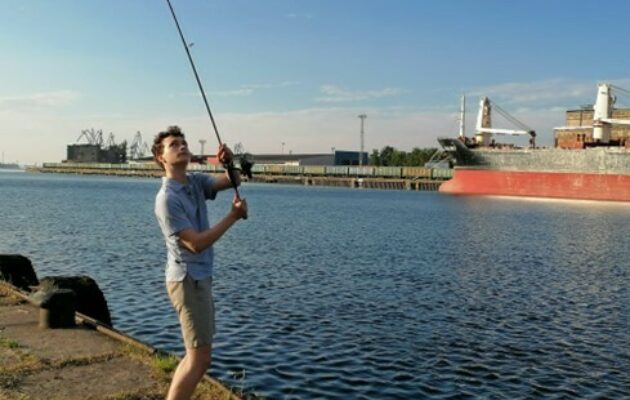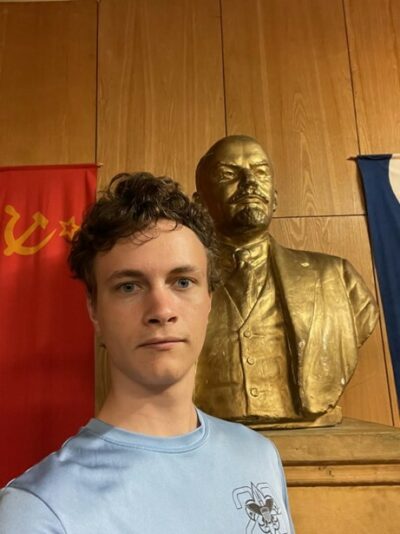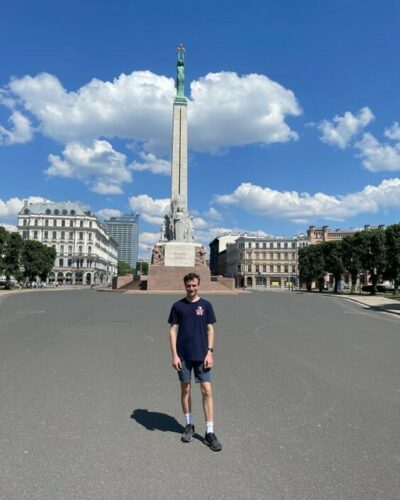
We’re asking students, recent grads, teachers, and counselors five questions on how languages play a role in shaping personal and professional success…
Meet David—a Delaware high school senior and NSLI-Y Russian Summer Program participant learning Russian and Spanish. In the future, he plans to study international business and pursue a career in diplomacy or international business.
1. Could you share with us a little about your earliest experiences with languages, either at home or at school?
My earliest interaction with another language was sign language. I was very young but I do remember bits of learning it. I knew more sign language than I could speak aloud, which confused my mom because although she knew some, I knew signs that she didn't.
For other world languages, it was Spanish: My mother took Spanish in high school and regretted not taking it in college. She tried teaching me some words throughout my childhood—words like perro, puerto, vamanos, and gato. I thought everyone knew the language, just because my mother used them so regularly with me. I took an introduction to Spanish my 7th grade year and while I may not have learned much, it was my first Spanish class and my only one before high school.
2. We’d love to hear more about your experience learning Spanish in school. Do you participate in any language or cultural activities outside of the classroom?
During my freshman year of high school I did not do as well as I would have liked in Spanish. I struggled with it at first, and definitely when COVID hit because online learning was not doing it for me. I finished my freshman year with a low B, so I started doing Duolingo all summer long. I did it a bit before and during my freshman year, but the summer before sophomore year I was always at the top of the Duo leaderboard. I got up to the highest league and had an over 200-day streak, so when I hit sophomore year I was ready. I finished with an A which was exciting.
I also started tutoring with a second cousin of mine who knew a lot of Spanish. My junior year, I joined the National Spanish Honors Society (NSHS) and for the majority of my service hours I volunteered at the Latin American Community Center. I’m now still in NSHS, and I also have a second Spanish tutor I hired off of italki, which is a website you can find language tutors on.
3. You recently participated in a 6-week National Security Language Initiative for Youth (NSLI-Y) program in Riga, Latvia—congratulations on your selection for this scholarship! What did the program involve and what would you say was the impact on your exploration of languages and cultures?
Before we went over, they had us work on our Russian listening skills using Pimsleur. When I got to Latvia I was overwhelmed with so many emotions that in the car with my host mother and brother I didn't know what to say. My host mother knew some English, but the rest of my host family didn't. My host siblings were 7 and 1.5 years old.

I lived in an apartment in Riga. I got my own room. I had language class every weekday for 4 hours, and I woke up at 7 a.m. because I took public transport which required two buses. It took me around an hour to get to the school from my house.
Every Saturday except one we would have an excursion to explore the history of Latvia—mostly the Soviet history. I first went on a tour around the old town and learned about its medieval history. I then went to a KGB museum in an old KGB prison. I took a bus tour around Riga to see all of the remaining Soviet things. During the tour, I got to explore a Soviet bunker. My last excursion was to Cēsis which is a town in Latvia with a medieval castle. I was also able to tour a bit of the U.S. Embassy in Latvia.
My experience living abroad has brought a whole new perspective to my love for language. I also have a deep love of international cultures.
I still am in contact with my host family today, because they were one of the highlights of my experience.
4. Why Russian? What inspires you to learn about this language and culture?
NSLI-Y offers certain languages not commonly taught in the U.S.: Russian, Turkish, Mandarin, Korean, Arabic, and others. I chose Russian because I know some people from Russia and Belarus, and also because I thought learning the Cyrillic alphabet would be very interesting.
5. What's something that surprised you about your experience abroad in Latvia?
I was surprised with life outside the city. My host family is from Viļāni, which is a small isolated village in Latvia. I got to see where my host mother grew up and helped them around the yard. She used to live on a farm and owns around 7 hectares of land. I got to see the well she used for water and around the house. I loved the experience.
I also didn’t expect how much I liked having a transportation pass! This allowed me to take buses all over the city, learning bus routes and tram routes. Riding around by myself or with friends gave me a sense of independence I haven't felt before. This, I feel, was useful to prepare me for college.

One experience I had was getting lost and finding a way back. I went close to the outskirts of the city to see an open air museum showing how people lived back when Riga was young.
It was a weekend, making transportation coming to the bus stops less frequent. I just caught the one bus that went to that area but the route took me to a place I did not know and I panicked. I opened Google Maps and tried to figure out the best bus route, but the options were very limited and it was raining. I was surprised to see a bus ready to leave: The app said it wouldn't be ready for 30 more minutes, and this bus would take me close to home. I took it. I still had a 10 minute walk in the pouring rain, but I felt accomplished after and increased my confidence in using public transportation.
BONUS QUESTION: Complete this thought: “Learning another language means…”
Learning another language means growing a better understanding of humanity and a new perspective on communication.
Check out our Connect with Russian and Spanish pages to explore language scholarships, university programs, testimonials, and more! And, as always, visit @LangConnectsFdn on social media to share your story with us.
